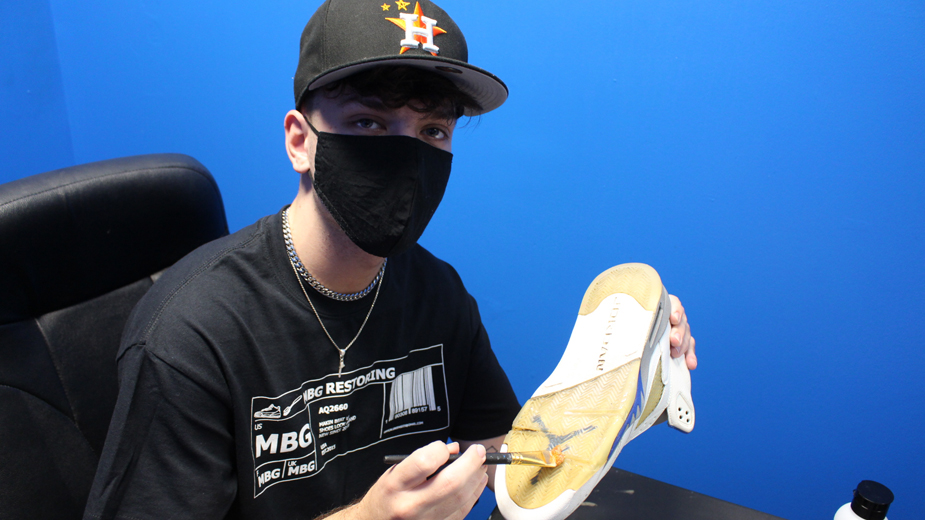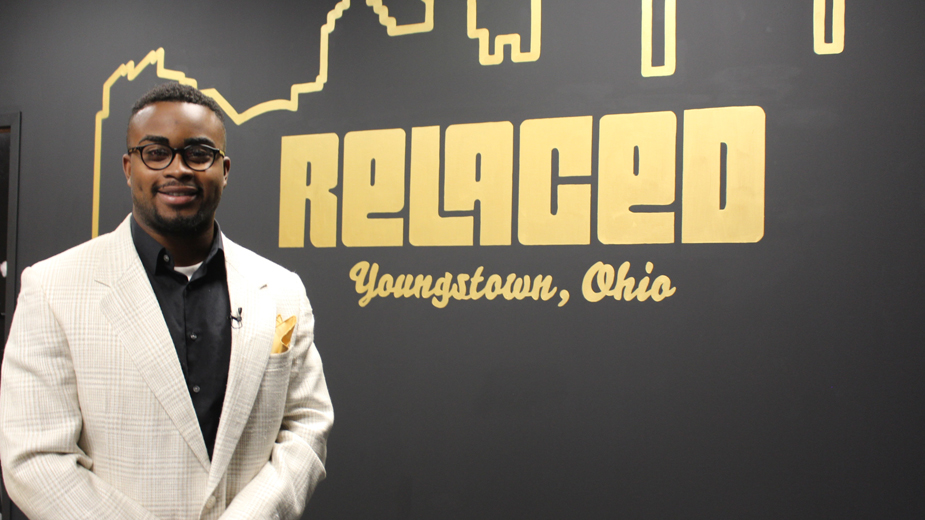YOUNGSTOWN, Ohio – When Maeson Green was 15, he was sitting at his lunch table at school when he got an idea.
Then an eighth-grade student at Austintown Middle School, Green saw how the shoes his friends and classmates wore every day would get dirty and worn out. As someone more likely to put on a dress shirt every day, Green kept his own shoes clean and often got compliments.
“It was a passion, something that I took pride in,” Green says. “Every time I walked out of my house, I wanted to look as good as possible.”
Green developed his own cleaning solution at home and offered to clean his classmates’ shoes, which he calls “pimping your kicks.” At first, he cleaned them for free, then started charging $5 a pair.
“From there, it just kind of took off,” he says. “If you can’t afford the million-dollar kicks, you can still make sure whatever kicks you have are clean.”
Students noticed Green’s work. That’s when the business began to roll in, he says. He named his business MBG Restoring and leveraged social media to build a loyal base of customers.
In the beginning, he attended weekend trade shows for streetwear fashion where he learned more about the industry and expanded his customer base. To increase his revenue, in 2017 Green expanded his business model to include reselling shoes.
At first, his parents didn’t understand the interest, he says. But soon he was traveling to larger shows with a car full of shoes to sell to vendors, increasing his capital. By traveling to shows in Illinois, Florida, California and New York, Green made connections with at least 10 vendors in eight states who provide him with resale merchandise, he says.
“The retail side is very lucrative,” he says.
According to the 2020 Resale Report from ThredUp, an online thrift store that specializes in high-quality secondhand goods, the secondhand market is on track to become a $64 billion industry in the next five years. In that time, resale is expected to account for $36 billion of that market, a 39% compound annual growth rate from its current market share of about $7 billion.
As Green learned more about the streetwear and resale clothing industry, he spent his senior year of high school sharpening his business acumen. Through the Small Business Administration’s Emerging Leaders program, offered though Youngstown State University, he learned how to develop a financial statement and why he should establish an LLC versus an S-corp. He also got advice on how to improve his business model.
Now 19 and beginning his second year as a management major at YSU, Green has expanded MBG Restoring beyond his family’s home. The company was incorporated in June 2019. On Black Friday, he’ll open his first storefront called Relaced at 3622 Belmont Ave., in Youngstown The 1,500-square-foot shop comprises retail space for resale shoes and vintage clothing, as well as space for restoration work.
Restorations make up 60% of the company’s business, although resale accounts for most of the revenue, he says. The majority of the restoration work is local and Green looks to expand that work once the store opens, he says.
“Every time we restore something, we’re keeping something alive,” he says. “And anything vintage, we’ll keep it alive and keep the cycle rolling because some of these styles are too nice to just go away.”
Most of his resale business is out-of-state and was helped by the coronavirus pandemic, he says. Relaced took preorders for limited releases from companies like Nike, Under Armour and Adidas, which was the only way some customers could purchase those items when shopping malls were closed from late March until May 12.
“We were still working,” he says, “For a while, we were becoming the No. 1 source of providing people in the Valley with these limited kicks that they see on social media or the website.”
Having a bricks-and-mortar site, he hopes, will ramp up the resale business locally, he says.
“Once the store opens as a nice central place for the MBG Restoring LLC headquarters and the Relaced store, the local engagement will grow tremendously,” he predicts. “If we have someone who purchases a pair of shoes from us, nine times out of 10 they’re going to come here to get them restored when they’re dirty.”
Attending trade shows also gave him more insight into the vintage and streetwear culture, he says. And it’s a culture he wanted to bring back to the Youngstown area.
“The ’90s and the ’80s style, and even the ’70s when you go back to Earth Wind and Fire, that stuff to me is so cool that it just can’t go away,” he says. “There’s so many different styles. There’s so many different cultures.”
In May, Green was awarded the $2,400 John Burgan Entrepreneurship prize to go toward his business. That’s when he met Betty Jo Licata. The dean of the YSU Williamson College of Business Administration says she was struck by someone starting a business while still in high school.
Younger entrepreneurs have an edge over their older counterparts, Licata says. Without certain financial obligations – marriage, kids and a mortgage – starting a business is a “lower risk option” at a young age, she says.
“The old wisdom used to be, you go out, get 20 years of experience and start your own business,” she says. “That is not the standard wisdom anymore.”
Now, it’s about having good advisers and learning from people with business experience, she says. The entrepreneurial ecosystem in the Mahoning Valley is maturing, she says, with many organizations working together to help entrepreneurs.
Students are gravitating toward that, she says, because they want to stay in the Mahoning Valley and they see starting a business as a way to benefit the community and employ residents. “I think as we create an entrepreneurial network and infrastructure in the Valley, we will see more of that,” she says.
Green agrees. He’s inspired by the work ethic of the Youngstown area, he says, as well as by his mother, who survived cancer twice before succumbing on April 2. His memory of watching his mother fight every day with her health issues is what drives him to continue to work and push forward, he says.
“One thing I learned was to never give up,” he says. “Never stop believing. Never stop praying.
“I wake up every day and I know that it’s time to get the gloves on and get in the ring and do God’s work,” he continues. “And most importantly, make this business succeed. Because I’ve got a lot of people looking at me now and I’ve got a lot of people counting on me. But most importantly I want to make my family proud. I want to make myself proud and do something positive in the city.”
Green employs six, who work as needed and on their own time. One is still in school and the others have jobs outside of Relaced.

Nathan Spalding, a real estate agent with Century 21 in Austintown, commits five to 10 hours weekly to shooting video for the company’s YouTube channel, Relaced TV, and spearheads its social media ad campaigns. Spalding sees his work with Relaced as intertwined with his real estate job, he says.
“Housing prices increase when there’s good businesses in the area,” he says. “I care about our area. I want to improve all parts of it. So if I can help develop a business that’s going to improve our area, I think that will help with real estate as well.”
David Vega, is taking a quarter off from Savannah College of Art and Design to help Green with the shoe restorations. He’ll train employees on restoration so eventually he can transition into doing clothing deals with Green. He’s also well versed in the streetwear culture.
“It’s constantly changing and constantly moving,” Vega says. “If you have that confidence, if you have that right mindset, you can really make a change. Especially in an area like Youngstown, where we don’t have so many people who are into it.”
And Green hopes to be a part of that change as he sees the streetwear culture gaining traction in the Youngstown area. He’s looking toward the future and hopes to take the Relaced brand nationwide, he says.
“I’m not going to stop until I get to where I want to be,” he says. “And when I get there, there’s going to be new dreams and new aspirations.”
Pictured: Maeson Green began his business by cleaning his classmates’ shoes, first for free and then for $5.
